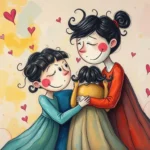
Have you ever woken up from a dream, your heart racing, feeling as though you had just shared a moment with someone you’ve lost? Dreams involving deceased family members often evoke a whirlwind of emotions, from comfort to confusion, leaving many of us pondering their meaning. These dreams can serve as a bridge between the living and the departed, a space where grief, love, and unresolved issues intertwine. If you’ve found yourself in this poignant scenario, you’re not alone, and understanding these dreams can be a source of healing and insight.
In this exploration, we will delve into the symbolism of deceased family members in dreams, analyze personal experiences through relatable scenarios, and finally, discuss how these encounters can lead to profound personal growth. Whether you’re seeking closure, guidance, or simply a connection, let’s navigate this intricate emotional landscape together.
Echoes of the Past: The Symbolism of Deceased Loved Ones
Dreaming of deceased family members often reflects unresolved feelings or the need for closure. In many cultures, these dreams are viewed as messages from beyond, providing comfort or guidance. The symbolism behind these dreams can vary widely depending on your relationship with the deceased and your current life circumstances.
-
Connection and Comfort: Dreams of lost family members frequently embody a sense of connection, signaling that they are still present in your life, albeit in a different form. This connection can be particularly strong during times of personal turmoil or grief, as the subconscious seeks reassurance.
-
Unresolved Issues: If there were unresolved conflicts or words left unspoken, these dreams may manifest as a way for your subconscious to process those feelings. They might urge you to reflect on your past interactions, offering a chance to address lingering tensions or emotions.
-
Guidance and Wisdom: In many traditions, deceased relatives are thought to impart wisdom through dreams. Their appearance can signify a need for guidance in your waking life, encouraging you to seek their wisdom in decision-making processes or emotional challenges.
-
Personal Reflection: Deceased family members often reflect our own characteristics or life choices. Their presence might prompt you to examine aspects of yourself that resonate with their traits or life lessons, pushing you toward self-discovery.
-
Cultural Perspectives: Different cultures approach dreams of the deceased in various ways. In some Indigenous cultures, these dreams are seen as a form of communication with the spirit world, while in others, they might be interpreted as manifestations of the dreamer’s unresolved emotions.
Understanding these symbolic meanings can help you navigate your feelings and reactions to such dreams, allowing you to process emotions that may otherwise remain buried beneath the surface.
Beyond the Veil: Personal Experiences with Deceased Family Members
Dreams often serve as a canvas for our subconscious, painting vivid scenarios that resonate with our emotional landscape. Here are a few relatable scenarios that illustrate how dreams featuring deceased family members can vary:
-
The Comforting Embrace: Imagine dreaming of your grandmother, who passed away years ago, wrapping her arms around you in a warm embrace. In this dream, you feel an overwhelming sense of safety and love. This scenario may reflect your need for comfort during a challenging time, reminding you that love transcends physical absence.
-
The Unfinished Conversation: You find yourself in a dream where you’re sitting at a dinner table with your late father, discussing a significant life decision. Despite the warmth of the meal, there’s an underlying tension as you struggle to express your feelings. This dream may symbolize your desire for closure or the need to address unfinished business related to your father’s passing.
-
The Guiding Presence: In a dream, you’re lost in a forest, feeling anxious and uncertain. Suddenly, your deceased aunt appears, pointing you toward a path filled with light. This scenario might suggest that you’re seeking guidance or reassurance in your waking life, and your aunt’s appearance represents the wisdom and support she offered during her lifetime.
-
The Reflection of Self: You dream of your late mother, who is speaking to you about your career choices. As you listen, you realize you’re mirroring her traits and values in your decision-making. This dream could indicate that you are grappling with your identity and choices, leading you to reflect on how your family’s legacy influences your life.
-
The Warning: In a more unsettling dream, you see a deceased family member looking worried or distressed. You feel compelled to help them, but the scene shifts into chaos. This dream may represent your fears or anxieties manifesting through the figure of the deceased, urging you to confront unresolved issues or personal challenges.
Each of these scenarios invites you to explore your emotions and thoughts regarding your deceased family members, potentially leading to understanding and healing. Remember, dreams can serve as both mirrors and windows, reflecting your inner landscape while also allowing glimpses into the connections you once shared.
Healing Through Dreams: Transforming Grief into Growth
Dreams of deceased family members can be both a source of comfort and a catalyst for personal growth. Engaging with these dreams offers an opportunity to reflect on your emotions, fostering healing and understanding. Here’s how to transform your experiences into a journey of growth:
-
Journaling Your Dreams: Start a dream journal to capture your experiences as soon as you wake up. Write down the details of your dreams, including how you felt during and after the experience. This practice can help you identify recurring themes or symbols, facilitating a deeper understanding of your emotional landscape.
-
Engaging in Reflection: After recording your dreams, take time to reflect on their meanings. Ask yourself what emotions arose during the dream and how they relate to your waking life. This introspection can help you uncover unresolved feelings and promote healing.
-
Creating Rituals: Honor the memory of your deceased loved ones through personal rituals. Whether it’s lighting a candle, visiting their resting place, or participating in a family tradition, these acts can create a sense of connection that transcends time and space, linking you to their legacy.
-
Seeking Support: If you’re struggling with grief or unresolved emotions, consider talking to a therapist or joining a support group. Sharing your experiences with others who have faced similar struggles can provide comfort and validation, helping you navigate your feelings more effectively.
-
Embracing Change: Recognize that dreams of deceased family members can signify transitions in your life. Their presence may encourage you to embrace change, adapt to new circumstances, or let go of past grievances. Use these insights as a guide to navigate your journey forward.
Ultimately, dreams involving deceased family members can be powerful agents of change, guiding you toward deeper self-awareness and healing. They offer a unique opportunity to engage with your emotions and memories, transforming grief into a profound source of strength.
Reflecting on these experiences can lead to a greater understanding of yourself and your loved ones, reminding you that even in their absence, their influence continues to shape your life. Embrace these dreams; they are not just echoes of the past, but beacons guiding you toward a brighter, more connected future.







